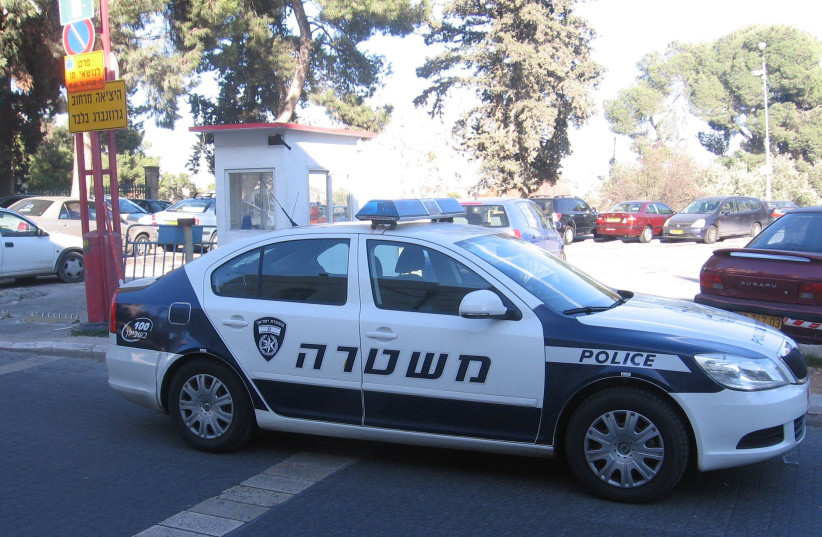On Friday at around 4 p.m., a Palestinian in the West Bank town of Huwara, located along Route 60, attempted to enter an Israeli vehicle and attack its driver.
The terrorist spotted a group of Border Police officers nearby, approached them and stabbed one of them in the face. Another officer tried to arrest the terrorist, who put up a protracted resistance and attempted to grab the officer’s firearm.
Fearing for his life and for the well-being of others, the officer shot and killed the terrorist.
This happened at 4 p.m. Just after 6 p.m., the Israel Police put out a statement, adding a picture of the policeman who had been stabbed in the face, in an attempt to set the narrative of what had happened.
The problem was that the Israel Police was on its own. In the much stronger and bigger IDF Spokesperson’s Office – which is in charge of operations in the West Bank, where the Border Police operate under the command of the IDF – and in the Foreign Ministry, there was silence. Not a word.
The problem was that on the other side – the side that is against Israel – there was a lot going on. About 40 minutes after the incident, Mohammed el-Kurd, a Palestinian journalist from east Jerusalem, tweeted 23 seconds of a video showing just the shooting but not the fight and attempt to steal the firearm.

“DO NOT LOOK AWAY FROM THIS VIDEO. EXECUTION FROM POINT-BLANK RANGE. THIS IS THE ISRAEL THAT THE WORLD DOES NOT WANT YOU TO SEE,” Kurd wrote.
What did the government do?
Did Israel do anything? The National Information Directorate put out the original police statement with the stabbing photo, but after that not much, not by the richly funded IDF Spokesperson’s Office and not by the Foreign Ministry. By Sunday morning, Kurd’s version of the video had been seen by 6.4 million people.
There was one Israeli who tried to change the narrative: Peter Lerner, a former IDF lieutenant-colonel and international spokesman. Lerner tweeted out the entire video – 38 seconds long – showing the protracted fight with three Palestinians, the attack against the policeman and the way he defended himself.
“You conveniently tweeted an edited version, missing the attempted rifle snatch by 3 perpetrators, stabbing by one, and finally the lethal shots in SELF DEFENSE,” Lerner wrote.
Why is this important? Because Lerner was doing what the state should have done. Where was the Foreign Ministry? Where was the IDF Spokesperson’s Office? Where was the Prime Minister’s Office?
All of this is important to consider when watching the harsh criticism leveled at Israel in response to the incident. UN Special Coordinator for the Middle East Peace Process Tor Wennesland slammed Israel at midnight on Friday.
“Horrified by today’s killing of a Palestinian man, Ammar Mifleh, during a scuffle with an Israeli soldier near Huwarra in the o.[occupied] West Bank. My heartfelt condolences to his bereaved family. Such incidents must be fully & promptly investigated, & those responsible held accountable,” the Norwegian diplomat tweeted.
Other diplomats followed suit and helped set a narrative that the shooting was wrong. Aside from Lerner, though, it was eerily quiet in Israel. Defense Minister Benny Gantz finally released a statement on Saturday at 7:40 p.m. – almost 18 hours after the shooting – and in Hebrew – which was strange considering it wasn’t the Israeli public who needed convincing.
17 and 31 hours
At 11 p.m. on Saturday – 31 hours after the incident – the Prime Minister’s Office issued talking points through the National Information Directorate. The Foreign Ministry actually tried to refute Wennesland’s tweet a few hours earlier, 17 hours after the UN envoy made his statement.
For 17 and 31 hours, Israel was mostly quiet. Did the world wait for Israel? Did people refrain from drawing a conclusion? Of course not.
The problem is that this happens far too often. The government, the IDF and other offices responsible for communications in Israel drop the ball repeatedly when it comes to explaining events. What they seem to fail to keep in mind is that there is never a vacuum in the media. If Israel doesn’t say something, someone else will. This applies when Israel has evidence that it was in the right, but also when it was in the wrong.
So while we owe Lerner a thanks – by Sunday morning his tweet was seen by over 500,000 people – we need to ask why this keeps happening. When will the country learn from these mistakes? When will we realize that a failure to explain has a direct impact on politics and diplomacy?
One place where this can change soon is in the IDF, which in January will be taken over by incoming Chief of Staff Maj.-Gen. Herzi Halevi. Halevi will have the opportunity to appoint a new IDF spokesperson and will, let’s hope, put someone in the role who understands the media, understands the foreign press and understands that a vacuum is unacceptable.
Tensions running high
What Halevi needs to understand is that he is taking over the IDF at a time when tensions will in any case be running high between Jerusalem and Washington. The Biden administration will be under pressure from within the Democratic Party to downgrade ties with the new Netanyahu government.
Halevi needs to understand that one badly managed incident – in the style of the bombing of the AP building in Gaza or the killing of Shireen Abu Akleh in Jenin – might be enough to get the White House to respond to that pressure.
He needs to take this seriously.
